2022 FORD F-650/750 windshield wipers
[x] Cancel search: windshield wipersPage 4 of 379

Introduction
About This Manual
..........................................7
Symbols Glossary ..........................................
10
Data Recording ................................................
13
Perchlorate ........................................................
17
Ford Credit .........................................................
17
Replacement Parts Recommendation ........................................................................\
....
17
Special Notices ...............................................
18
Mobile Communications Equipment ........................................................................\
...
19
Export Unique Options ...............................
20
Federal Highway Administration Regulation ...................................................
20
Entering, Exiting or Climbing on This Vehicle ...........................................................
20
Environment
Protecting the Environment .......................
21
Noise Pollution Control ................................
21
At a Glance
Instrument Panel ...........................................
23
Child Safety
General Information .....................................
24
Installing Child Restraints ..........................
26
Booster Seats .................................................
32
Child Restraint Positioning ........................
34
Child Safety Locks ........................................
35
Seatbelts
Principle of Operation ..................................
37
Fastening the Seatbelts .............................
38
Seatbelt Height Adjustment ......................
41
Seatbelt Warning Lamp and Indicator Chime ............................................................
42
Seatbelt Reminder ........................................
42
Child Restraint and Seatbelt Maintenance ...............................................
44
Seatbelt Extensions .....................................
44Keys and Remote Controls
General Information on Radio
Frequencies .................................................
45
Remote Control .............................................
46
Replacing a Lost Key or Remote Control ........................................................................\
...
47
Doors and Locks
Locking and Unlocking ...............................
48
Security
Passive Anti-Theft System .......................
50
Steering Wheel
Adjusting the Steering Wheel ....................
51
Cruise Control - Vehicles With: Adaptive Cruise Control ..............................................
51
Cruise Control - Vehicles With: Cruise Control ...........................................................
51
Information Display Control ......................
52
Horn ....................................................................
52
Wipers and Washers
Windshield Wipers ........................................
53
Windshield Washers ....................................
53
Lighting
General Information .....................................
54
Lighting Control .............................................
54
Autolamps .......................................................
55
Instrument Lighting Dimmer ....................
55
Headlamp Exit Delay ...................................
55
Daytime Running Lamps - Vehicles With: Daytime Running Lamps (DRL) ..........
56
Daytime Running Lamps - Vehicles With: Configurable Daytime Running Lamps
........................................................................\
..
56
Automatic High Beam Control ................
56
Direction Indicators .......................................
57
Interior Lamps ................................................
58
1
2022 F650750 (TBC) , enUSA, Edition date: 202010, Second-Printing Table of Contents
Page 26 of 379
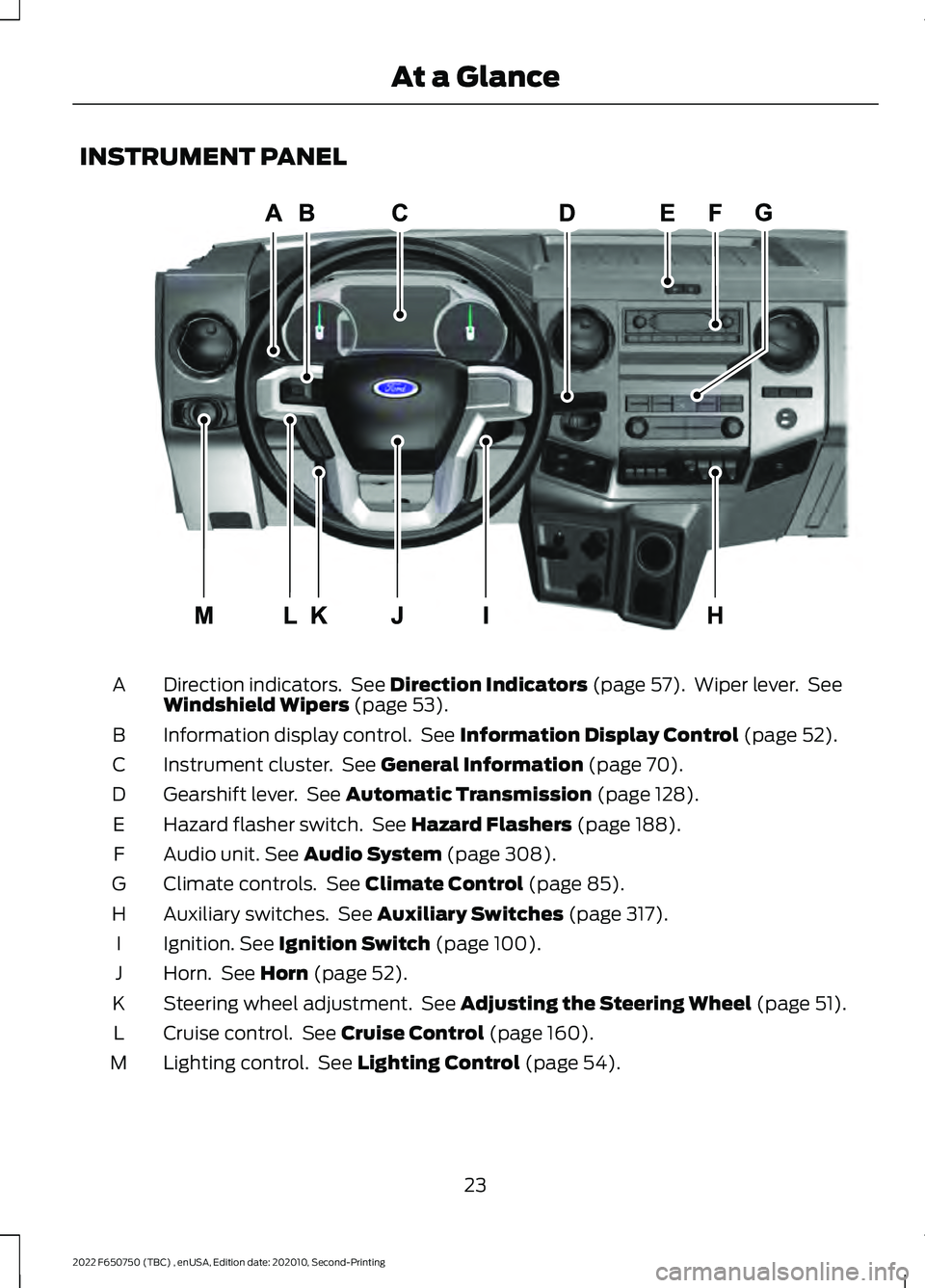
INSTRUMENT PANEL
Direction indicators. See Direction Indicators (page 57). Wiper lever. See
Windshield Wipers (page 53).
A
Information display control. See
Information Display Control (page 52).
B
Instrument cluster. See
General Information (page 70).
C
Gearshift lever. See
Automatic Transmission (page 128).
D
Hazard flasher switch. See
Hazard Flashers (page 188).
E
Audio unit.
See Audio System (page 308).
F
Climate controls. See
Climate Control (page 85).
G
Auxiliary switches. See
Auxiliary Switches (page 317).
H
Ignition.
See Ignition Switch (page 100).
I
Horn. See
Horn (page 52).
J
Steering wheel adjustment. See
Adjusting the Steering Wheel (page 51).
K
Cruise control. See
Cruise Control (page 160).
L
Lighting control. See
Lighting Control (page 54).
M
23
2022 F650750 (TBC) , enUSA, Edition date: 202010, Second-Printing At a GlanceE307565
Page 56 of 379
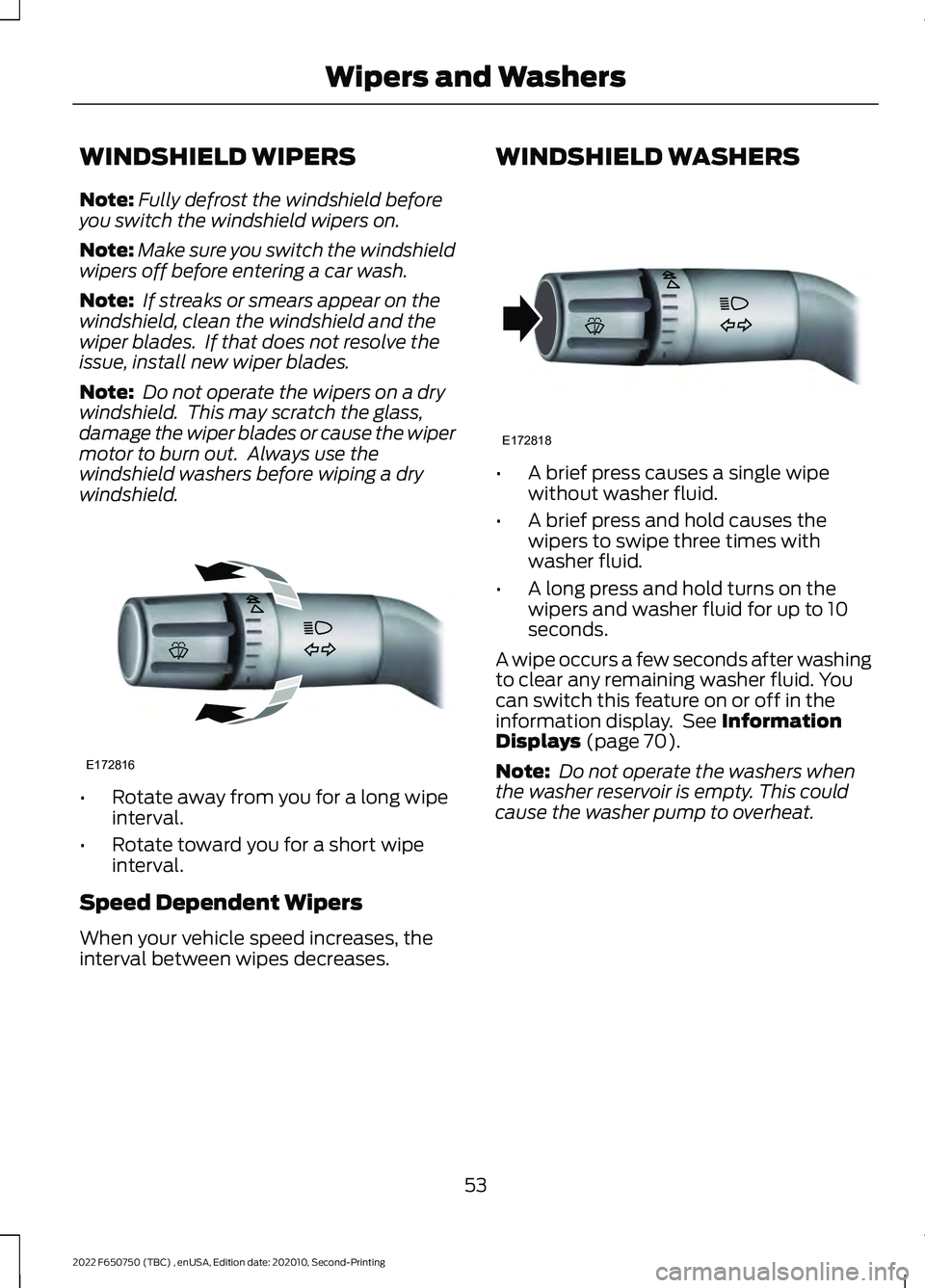
WINDSHIELD WIPERS
Note:
Fully defrost the windshield before
you switch the windshield wipers on.
Note: Make sure you switch the windshield
wipers off before entering a car wash.
Note: If streaks or smears appear on the
windshield, clean the windshield and the
wiper blades. If that does not resolve the
issue, install new wiper blades.
Note: Do not operate the wipers on a dry
windshield. This may scratch the glass,
damage the wiper blades or cause the wiper
motor to burn out. Always use the
windshield washers before wiping a dry
windshield. •
Rotate away from you for a long wipe
interval.
• Rotate toward you for a short wipe
interval.
Speed Dependent Wipers
When your vehicle speed increases, the
interval between wipes decreases. WINDSHIELD WASHERS
•
A brief press causes a single wipe
without washer fluid.
• A brief press and hold causes the
wipers to swipe three times with
washer fluid.
• A long press and hold turns on the
wipers and washer fluid for up to 10
seconds.
A wipe occurs a few seconds after washing
to clear any remaining washer fluid. You
can switch this feature on or off in the
information display. See Information
Displays (page 70).
Note: Do not operate the washers when
the washer reservoir is empty. This could
cause the washer pump to overheat.
53
2022 F650750 (TBC) , enUSA, Edition date: 202010, Second-Printing Wipers and WashersE172816 E172818
Page 58 of 379
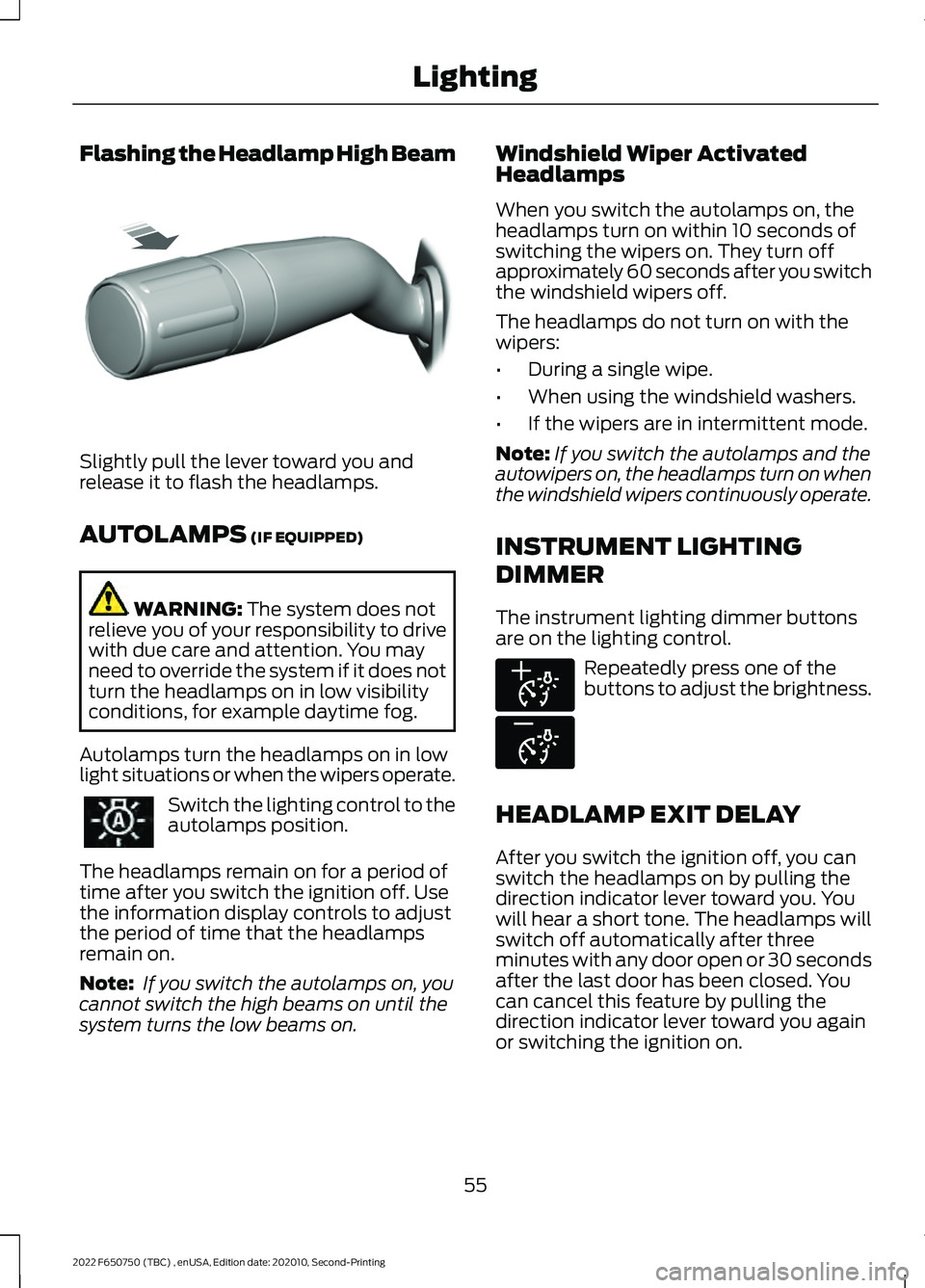
Flashing the Headlamp High Beam
Slightly pull the lever toward you and
release it to flash the headlamps.
AUTOLAMPS (IF EQUIPPED)
WARNING:
The system does not
relieve you of your responsibility to drive
with due care and attention. You may
need to override the system if it does not
turn the headlamps on in low visibility
conditions, for example daytime fog.
Autolamps turn the headlamps on in low
light situations or when the wipers operate. Switch the lighting control to the
autolamps position.
The headlamps remain on for a period of
time after you switch the ignition off. Use
the information display controls to adjust
the period of time that the headlamps
remain on.
Note: If you switch the autolamps on, you
cannot switch the high beams on until the
system turns the low beams on. Windshield Wiper Activated
Headlamps
When you switch the autolamps on, the
headlamps turn on within 10 seconds of
switching the wipers on. They turn off
approximately 60 seconds after you switch
the windshield wipers off.
The headlamps do not turn on with the
wipers:
•
During a single wipe.
• When using the windshield washers.
• If the wipers are in intermittent mode.
Note: If you switch the autolamps and the
autowipers on, the headlamps turn on when
the windshield wipers continuously operate.
INSTRUMENT LIGHTING
DIMMER
The instrument lighting dimmer buttons
are on the lighting control. Repeatedly press one of the
buttons to adjust the brightness.
HEADLAMP EXIT DELAY
After you switch the ignition off, you can
switch the headlamps on by pulling the
direction indicator lever toward you. You
will hear a short tone. The headlamps will
switch off automatically after three
minutes with any door open or 30 seconds
after the last door has been closed. You
can cancel this feature by pulling the
direction indicator lever toward you again
or switching the ignition on.
55
2022 F650750 (TBC) , enUSA, Edition date: 202010, Second-Printing LightingE311233 E291299 E296433
Page 267 of 379
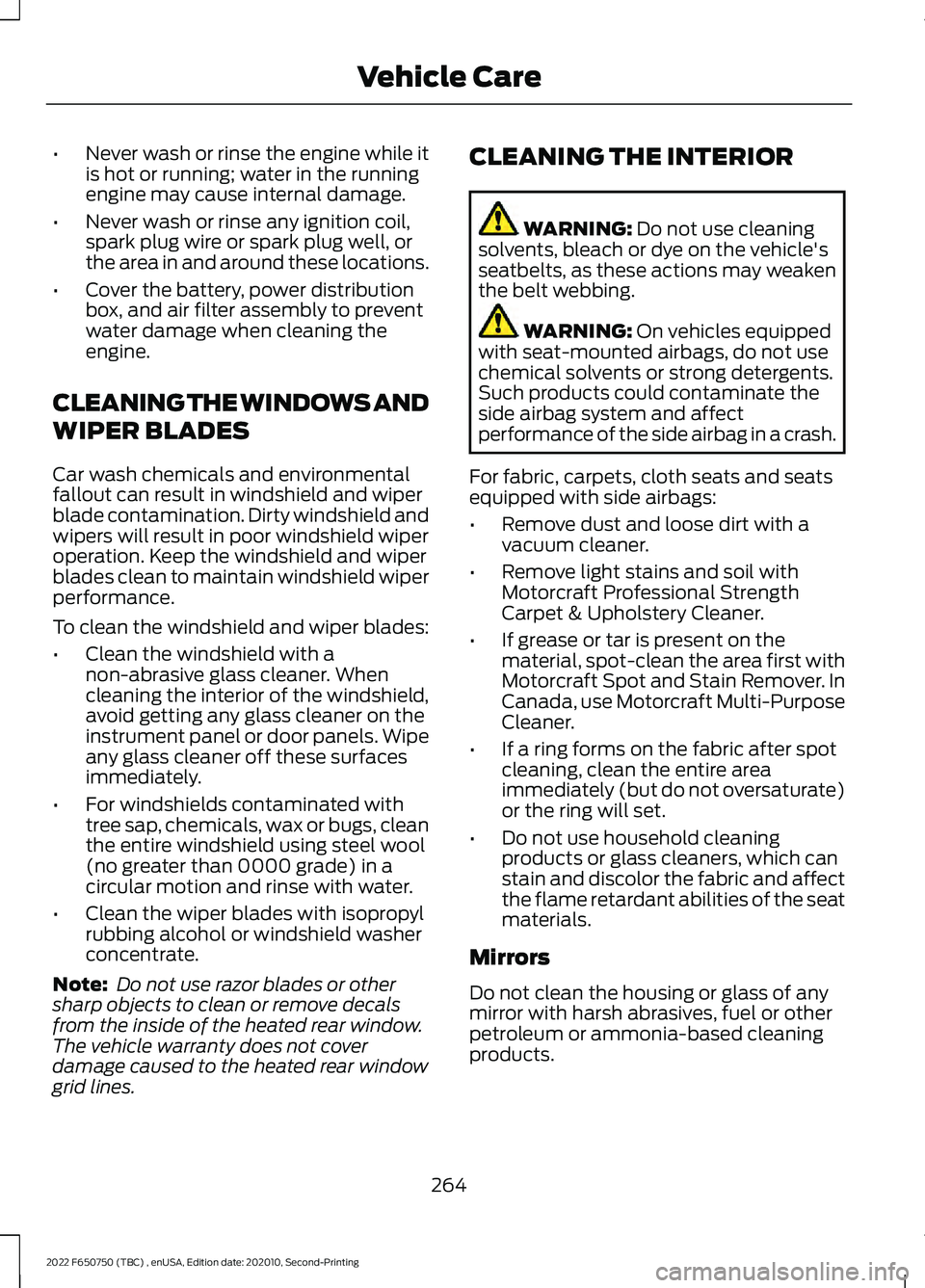
•
Never wash or rinse the engine while it
is hot or running; water in the running
engine may cause internal damage.
• Never wash or rinse any ignition coil,
spark plug wire or spark plug well, or
the area in and around these locations.
• Cover the battery, power distribution
box, and air filter assembly to prevent
water damage when cleaning the
engine.
CLEANING THE WINDOWS AND
WIPER BLADES
Car wash chemicals and environmental
fallout can result in windshield and wiper
blade contamination. Dirty windshield and
wipers will result in poor windshield wiper
operation. Keep the windshield and wiper
blades clean to maintain windshield wiper
performance.
To clean the windshield and wiper blades:
• Clean the windshield with a
non-abrasive glass cleaner. When
cleaning the interior of the windshield,
avoid getting any glass cleaner on the
instrument panel or door panels. Wipe
any glass cleaner off these surfaces
immediately.
• For windshields contaminated with
tree sap, chemicals, wax or bugs, clean
the entire windshield using steel wool
(no greater than 0000 grade) in a
circular motion and rinse with water.
• Clean the wiper blades with isopropyl
rubbing alcohol or windshield washer
concentrate.
Note: Do not use razor blades or other
sharp objects to clean or remove decals
from the inside of the heated rear window.
The vehicle warranty does not cover
damage caused to the heated rear window
grid lines. CLEANING THE INTERIOR WARNING: Do not use cleaning
solvents, bleach or dye on the vehicle's
seatbelts, as these actions may weaken
the belt webbing. WARNING:
On vehicles equipped
with seat-mounted airbags, do not use
chemical solvents or strong detergents.
Such products could contaminate the
side airbag system and affect
performance of the side airbag in a crash.
For fabric, carpets, cloth seats and seats
equipped with side airbags:
• Remove dust and loose dirt with a
vacuum cleaner.
• Remove light stains and soil with
Motorcraft Professional Strength
Carpet & Upholstery Cleaner.
• If grease or tar is present on the
material, spot-clean the area first with
Motorcraft Spot and Stain Remover. In
Canada, use Motorcraft Multi-Purpose
Cleaner.
• If a ring forms on the fabric after spot
cleaning, clean the entire area
immediately (but do not oversaturate)
or the ring will set.
• Do not use household cleaning
products or glass cleaners, which can
stain and discolor the fabric and affect
the flame retardant abilities of the seat
materials.
Mirrors
Do not clean the housing or glass of any
mirror with harsh abrasives, fuel or other
petroleum or ammonia-based cleaning
products.
264
2022 F650750 (TBC) , enUSA, Edition date: 202010, Second-Printing Vehicle Care
Page 270 of 379
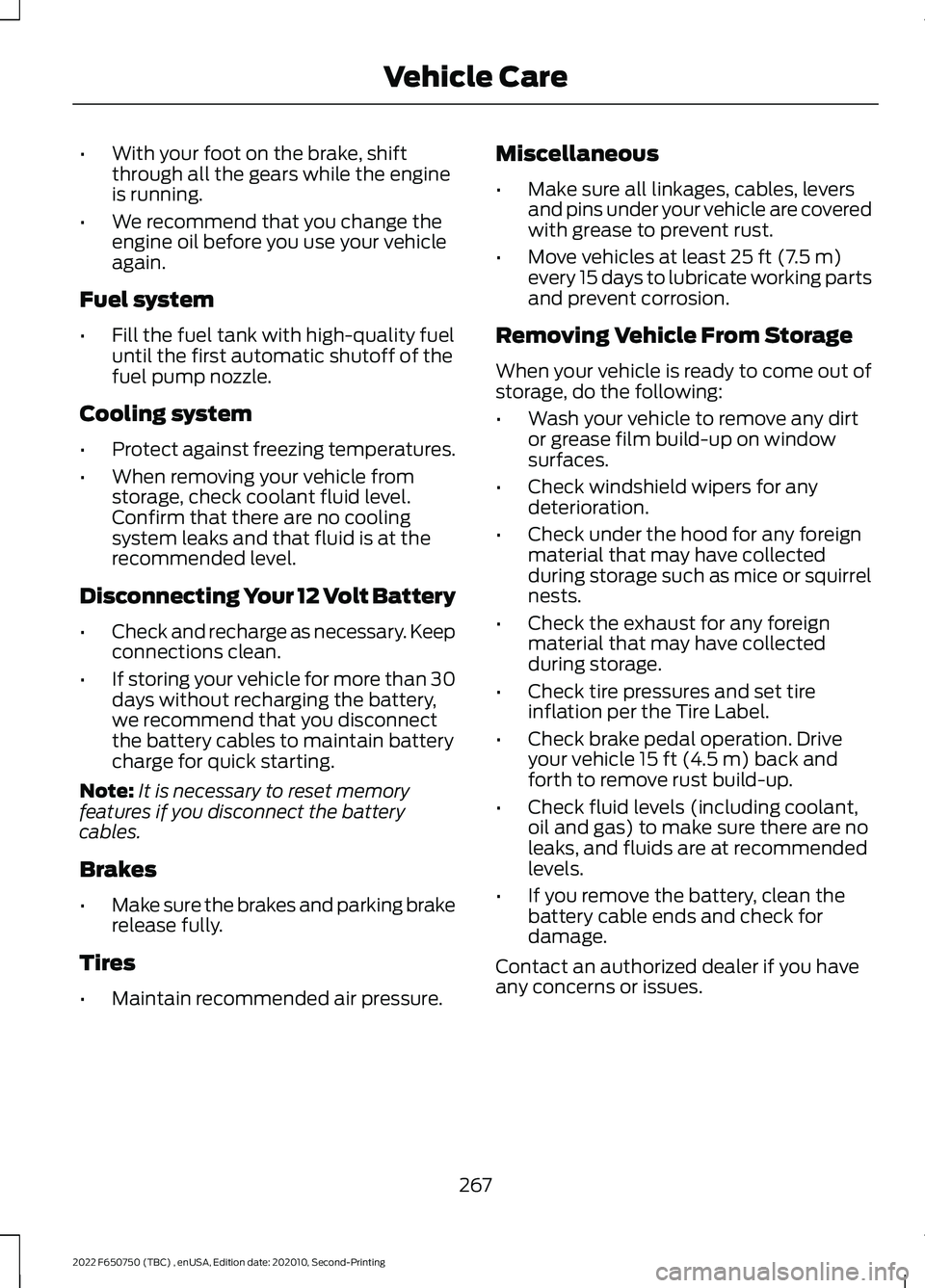
•
With your foot on the brake, shift
through all the gears while the engine
is running.
• We recommend that you change the
engine oil before you use your vehicle
again.
Fuel system
• Fill the fuel tank with high-quality fuel
until the first automatic shutoff of the
fuel pump nozzle.
Cooling system
• Protect against freezing temperatures.
• When removing your vehicle from
storage, check coolant fluid level.
Confirm that there are no cooling
system leaks and that fluid is at the
recommended level.
Disconnecting Your 12 Volt Battery
• Check and recharge as necessary. Keep
connections clean.
• If storing your vehicle for more than 30
days without recharging the battery,
we recommend that you disconnect
the battery cables to maintain battery
charge for quick starting.
Note: It is necessary to reset memory
features if you disconnect the battery
cables.
Brakes
• Make sure the brakes and parking brake
release fully.
Tires
• Maintain recommended air pressure. Miscellaneous
•
Make sure all linkages, cables, levers
and pins under your vehicle are covered
with grease to prevent rust.
• Move vehicles at least 25 ft (7.5 m)
every 15 days to lubricate working parts
and prevent corrosion.
Removing Vehicle From Storage
When your vehicle is ready to come out of
storage, do the following:
• Wash your vehicle to remove any dirt
or grease film build-up on window
surfaces.
• Check windshield wipers for any
deterioration.
• Check under the hood for any foreign
material that may have collected
during storage such as mice or squirrel
nests.
• Check the exhaust for any foreign
material that may have collected
during storage.
• Check tire pressures and set tire
inflation per the Tire Label.
• Check brake pedal operation. Drive
your vehicle
15 ft (4.5 m) back and
forth to remove rust build-up.
• Check fluid levels (including coolant,
oil and gas) to make sure there are no
leaks, and fluids are at recommended
levels.
• If you remove the battery, clean the
battery cable ends and check for
damage.
Contact an authorized dealer if you have
any concerns or issues.
267
2022 F650750 (TBC) , enUSA, Edition date: 202010, Second-Printing Vehicle Care
Page 379 of 379

U
Under Hood Overview - 6.7L Diesel.......221
Under Hood Overview - 7.3L....................222
USB Ports..........................................................97
USB Port..........................................................315
Using Adaptive Cruise Control................154
Using Snow Chains.....................................283
Using Stability Control................................152
Using Traction Control - Vehicles With: Air Brakes
......................................................148
Using Traction Control - Vehicles With: Hydraulic Brakes
........................................148
Using Voice Recognition............................316
V
Vehicle Care....................................................261 General Information.......................................... 261
Vehicle Identification Number...............305 Locating the Vehicle Identification
Number............................................................ 305
Vehicle Identification Number Overview.......................................................... 305
Vehicle Identification.................................305 Vehicle Identification Number......................305
Vehicle Inspection Guide..........................209
Vehicle Inspection Information..............209
Vehicle Storage
............................................266
Ventilation See: Climate Control........................................... 85
W
Warning Lamps and Indicators................66
Washer Fluid Check....................................248
Washer Fluid Specification......................299
Washers See: Cleaning the Exterior.............................. 262
See: Wipers and Washers................................. 53
Waxing.............................................................263
What Is Cruise Control...............................160
Wheel Nuts See: Changing a Road Wheel....................... 283
Wheels and Tires.........................................268 Technical Specifications................................. 285
Windows and Mirrors
....................................59
Windshield Washers.....................................53 Windshield Wipers
.........................................53
Wiper Blades See: Checking the Wiper Blades.................. 248
Wipers and Washers.....................................53
376
2022 F650750 (TBC) , enUSA, Edition date: 202010, Second-Printing Index